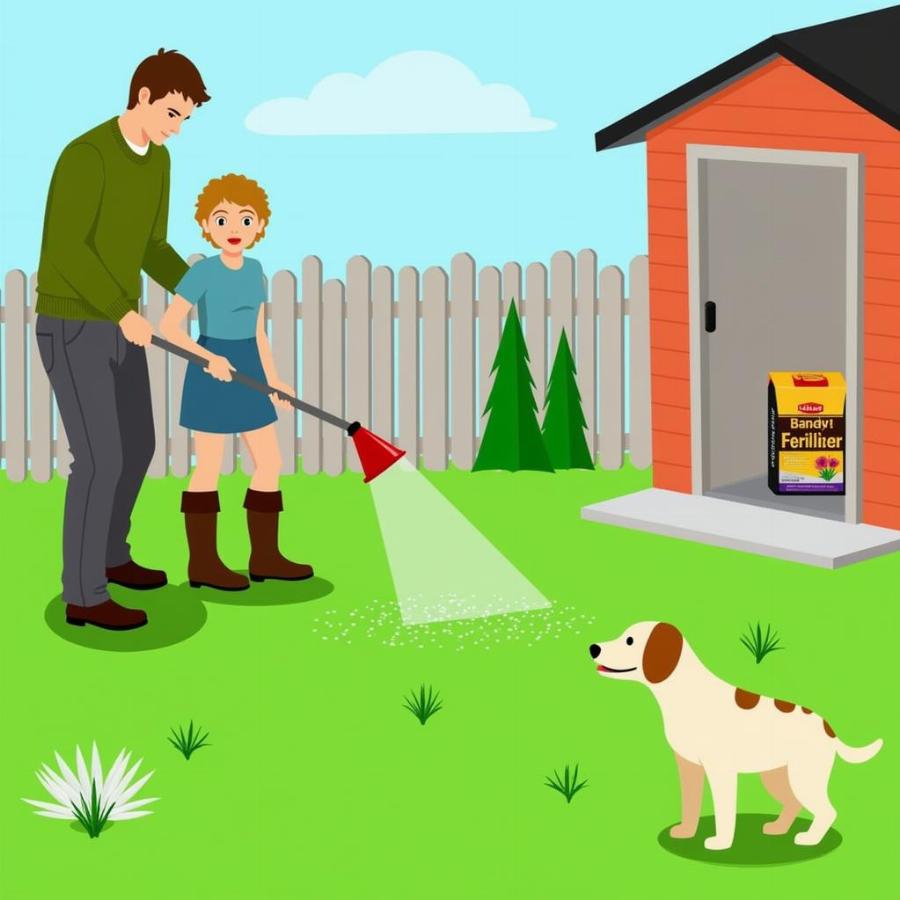Fertilizer and dogs can be a dangerous combination. While a lush, green lawn is appealing, the chemicals in fertilizers can pose serious health risks to our furry friends. This article will explore the potential dangers of fertilizers for dogs, how to choose pet-safe alternatives, and steps you can take to protect your beloved companion. Understanding the risks and taking preventative measures can ensure your dog enjoys a healthy and happy life in a beautiful, safe environment.
Understanding the Risks of Fertilizers to Dogs
Fertilizers, while beneficial for plant growth, contain a variety of chemicals that can be harmful to dogs if ingested or even absorbed through their paws. These chemicals can cause a range of symptoms, from mild skin irritation to severe gastrointestinal distress and even life-threatening conditions. Common fertilizer ingredients like nitrogen, phosphorus, and potassium, while generally safe in low concentrations, can be toxic in larger amounts. In addition, some fertilizers contain herbicides and insecticides that are even more dangerous for dogs.
Types of Fertilizer and Their Dangers
Different types of fertilizers pose different levels of risk to dogs. Granular fertilizers, for instance, can be particularly enticing to dogs due to their texture and smell, leading to accidental ingestion. Liquid fertilizers, while less likely to be eaten, can still be absorbed through the paws and cause skin irritation or other problems if licked off. Organic fertilizers, while generally considered safer, can still pose a risk if they contain certain ingredients like bone meal, which can attract dogs and cause digestive issues if consumed in large quantities.
Choosing Pet-Safe Fertilizer Options
Fortunately, there are several pet-safe fertilizer options available that allow you to maintain a healthy lawn without compromising your dog’s safety. Look for products specifically labeled as “pet-safe” or “child and pet-safe.” These fertilizers typically utilize natural ingredients and avoid harsh chemicals. Some popular choices include fertilizers derived from seaweed, fish emulsion, and compost.
Making Your Own Pet-Safe Fertilizer
You can also create your own pet-safe fertilizer using ingredients like compost, grass clippings, and coffee grounds. This not only ensures the safety of your pet but also provides an environmentally friendly alternative to chemical fertilizers. grass fertilizer that is safe for dogs provides detailed information on creating and using homemade fertilizers.
Protecting Your Dog from Fertilizer Exposure
Even with pet-safe fertilizers, it’s essential to take precautions to minimize your dog’s exposure. Always water your lawn thoroughly after applying any fertilizer, allowing the product to soak into the soil and reducing the risk of contact with your dog’s paws. Keep fertilizers stored securely out of reach in a locked shed or garage.
Supervising Your Dog in Fertilized Areas
Supervise your dog closely when they are in areas where fertilizer has been applied, especially during the first 24-48 hours. grass fertilizer safe for dogs offers additional tips on supervising your dog in potentially hazardous areas. Consider garden fencing for dogs to restrict access to specific areas of your yard. If you suspect your dog has ingested fertilizer, contact your veterinarian immediately.
 Bảo vệ chó khỏi phân bón
Bảo vệ chó khỏi phân bón
What if my dog eats fertilizer?
If your dog ingests fertilizer, seek immediate veterinary attention. Symptoms of fertilizer poisoning can include vomiting, diarrhea, drooling, lethargy, tremors, and difficulty breathing. Quick action is crucial for a positive outcome. fertilizer safe for dogs provides a comprehensive list of symptoms and actions to take in case of accidental ingestion.
Is artificial grass a safer option for dogs?
Artificial grass eliminates the need for fertilizers, presenting a potentially safer environment. However, it’s important to ensure proper drainage to prevent the buildup of bacteria from urine. can dogs wee on artificial grass addresses this topic in detail.
Conclusion
Protecting your dog from the potential dangers of fertilizer is a vital aspect of responsible pet ownership. By understanding the risks, choosing pet-safe alternatives, and taking appropriate preventative measures, you can create a safe and healthy environment for your furry friend to thrive. Remember, a beautiful lawn shouldn’t come at the expense of your dog’s well-being.
FAQ
- What are the common signs of fertilizer poisoning in dogs?
- Are organic fertilizers completely safe for dogs?
- How long should I keep my dog away from a fertilized lawn?
- What are some alternatives to traditional lawn fertilizers?
- How can I make my own pet-safe fertilizer?
- What should I do if my dog ingests a large amount of fertilizer?
- Are there any long-term health effects of fertilizer exposure in dogs?
Beaut Dogs is your trusted source for all things dog-related, offering expert advice and valuable resources to help you care for your canine companion. From breed information to health tips and product recommendations, Beaut Dogs is dedicated to providing dog owners with the knowledge they need to ensure their dogs live long, healthy, and happy lives. When you need expert advice, please contact Email: [email protected] to have Beaut Dogs answer in detail and accurately.